Josh Kerr Storms To His First World 1,500m Title After Epic Kick
Josh Kerr Storms To His First World 1,500m Title After Epic Kick
More on Josh Kerr's remarkable 1,500m win at the World Championships from Wednesday's action.
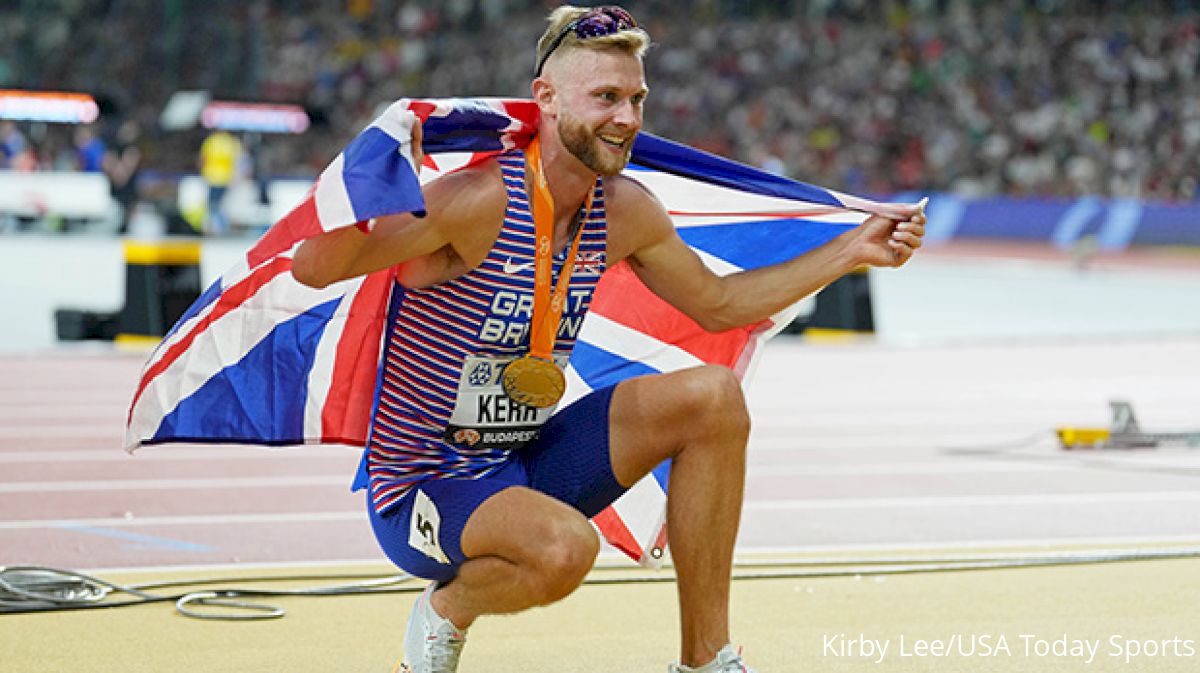
By Race Results Weekly
BUDAPEST -- As one British journalist put it, "The world 1,500m title remains in Edinburgh."
A year after Jake Wightman's stunning victory over Norway's Jakob Ingebrigtsen at the World Championships in Eugene, another Scotsman took the gold at the National Athletics Center on Wednesday night.
Josh Kerr, 25, the Tokyo Olympic bronze medalist, ran the perfect race and took home the title in 3:29.38, once again leaving the immensely talented Ingebrigtsen as the silver-medalist.
"This is just reward for many years of hard work," Kerr said. "I'm extremely proud to be on top of the world. I did just what I always do, throw everything I have at it and see if it breaks my way."
Indeed it did. Ingebrigtsen approached the race in his usual style. After following the early pace of Abel Kipsang of Kenya -- 56.1 seconds through 400m -- Ingebrigtsen took the lead 100 meters later. He led the field through 800m in 1:54.2 and soon Kerr moved up to second.
The former NCAA star for the University of New Mexico waited for the right moment and with about 200 meters to go he went past Ingebrigtsen on the outside and began his final sprint.
"I came around the bend and I thought I have to give everything I have," Kerr said. "I didn't worry about what was going on earlier in the race, just made sure I was there with 200m to go."
Ingebrigtsen responded at first, but as Kerr hit his full stride in the final 75 meters, the Norwegian relented. He looked up at the stadium's video display to make sure he had sole possession of second, and that's where he finished in 3:29.65.
"In the last 30 meters I thought, 'I want this so badly, I don't care about how much pain I'm in,'" Kerr said. "I'm going to do everything to get to the finish line first."
Speaking to reporters, Ingebrigtsen explained that he had been battling a sore throat and wasn't in his best form.
"I'm of course disappointed," Ingebrigtsen began. "All credit to Kerr; he did a great race. I feel a little bit unlucky for being in this position. I felt very similar to the World Indoors; got a little bit of a dry throat in the warm-up of the semi-final, escalated to being a sore throat in the evening. It got a lot better this morning, but obviously not feeling one hundred percent."
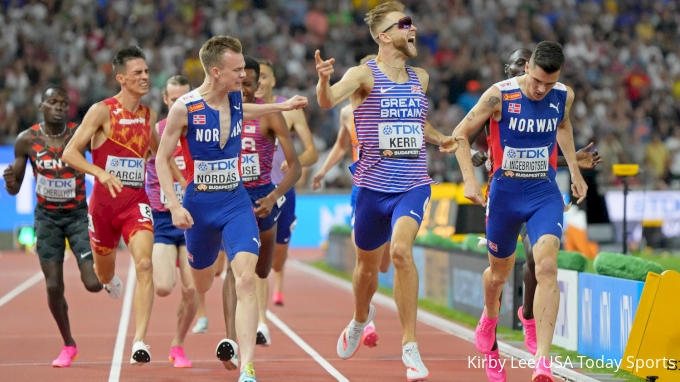
The battle for third-place was nearly as exciting as the one for first. Another Norwegian, Narve Gilje Nordas, was sitting in seventh-place with 200 meters to go. Coming around the bend, he launched the greatest sprint of his young career. He broke out of the pack, then ran down Kipsang to take the bronze in 3:29.68, nearly catching Ingebrigtsen. Kipsang ended up fourth in 3:29.89.
"Yes, just an amazing feeling," Nordas told reporters. "I maybe started the kick a bit too late; I never really got lactic on the homestretch. I should have started the kick earlier and maybe got the gold. I aimed for a medal today and got the medal."
Nordas, 24, had nearly quit the sport. He was mostly a 5,000m runner, and in 2020 his 1,500m personal best was only 3:39.15. Under the coaching of Jakob Ingebrigtsen's father, Gjert, Nordas re-dedicated himself to athletics and began to run much higher mileage (190 km per week, he said). He brought his 1500m personal best all the way down to 3:29.47 in June of this year and realized that he had found his place in the sport.
"You can say that even two months ago I wasn't even sure if I was going to compete in the World Championships, or if it was going to be in the 5-K or 1500," Nordas marveled. "A year ago I ran Europeans and took 17th place in the 5-K. I was so close to just quit running; I felt terrible, was burnt out. I just wanted to stop competing on the track."
American Yared Nuguse got fifth in 3:30.25. He executed his race well, but didn't quite have the extra top speed in the end to get a medal.
"I think it just kind of felt like there was one more gear that I was trying to reach and I wasn't able to get to it," Nuguse said. "I also could have stayed out of more trouble with, like, people coming in on me and what not. That's just stuff that you learn at your first Worlds that you take on to the next one."
HASSAN, KIPYEGON ADVANCE TO 5000M FINAL
The women's 5,000m heats, which were moved from the late morning to the early evening because of the heat, resulted in most of the medal contenders advancing to the final. Two of the biggest athletes, Dutchwoman Sifan Hassan and Kenyan Faith Kipyegon, finished one-two in the second of two heats.
Behind Hassan's relentless pace at the front, the pair ran 14:32.29 and 14:32.31, respectively. Hassan, who usually likes to run at the back, said that she felt like making it a fast race today.
"I want to see what my body felt, and I think I am just addicted to pain," Hassan said. She added: "I said, let me make it some hard race."
The first heat was nearly stolen by Latvian teenager Agate Caune, the 2023 European U20 3,000m and 5,000m champion.
Doing as her coach had instructed, the 19 year-old ran level laps to try to run in the 15-minute range. The main pack ignored her and she built up a lead of about 24 seconds by 3,000m (8:54.1). At the bell, she was still about seven seconds ahead and although she was passed by the first three women in the final 100 meters, she wound up fourth in a personal best 15:00.48 and, as a top-eight finisher, advanced to the final.
"We had a plan," Caune told Race Results Weekly. "From the beginning I understand that this race would be slow, and I can't run from the beginning slow and then fast. I need to push myself from the beginning. I did a great job. Yes, of course, the last hundred meters was hard for me -- you see everybody is going (past me) -- that's also when I fight with myself. I did my best."
Two of the three Americans, Elise Cranny and Alicia Monson, also made the final by finishing fifth and seventh, respectively, in the first heat in 15:01.53 and 15:03.35. Both had raced the 10,000m last Saturday and felt a strong sense of relief after advancing tonight.
"It's all about getting through to the final," Monson said. "Like, don't spend too much time on the prelim. Just make sure you're getting through. I'm feeling good for Saturday."
WOMEN'S 800M QUALIFYING GOES ACCORDING TO PLAN
There were no surprises in the women's 800m qualifying, which took place mid-morning in 90-degree heat.
All of the medal favorites advanced, including defending champion Athing Mu of the USA, who won the seventh and final heat in 1:59.59, fifth-fastest time of the day.
Mu, 21, who wore a special pair of sequined Nike racing shoes, took the lead from the gun and opened up a five-meter gap on Jamaica's Natoya Goule-Toppin. She split halfway in a crisp 58.1 seconds and was still the leader at 600m.
Rounding the final bend, Goule-Toppin started to close the gap, and actually edged past Mu inside of the final 20 meters, but Mu pressed a little more to get the win with Goule-Toppin second in 1:59.64.
"You know, I just wanted to finish and make the top two," Goule-Toppin said. "I made the first lap a little easy for myself because it's just the first round; I just wanted to qualify, I just wanted to finish. You've still got to push at the end of an 800m."
Mu did not stop to speak with the media.
Keely Hodgkinson of Great Britain, last summer's silver medalist in Eugene, won the first heat in 1:59.53. Typically a front-runner, the 21 year-old decided to sit back this morning and was only in sixth position at the bell. She said that was her plan today.
"I wanted to sit back and qualify, safely," she told a group of mostly British reporters in the mixed zone while cooling herself with a hand-held fan. "I didn't go to the front like I usually do. I thought I'd sit back and see what the girls would do and I just chased them in the last 200."
When asked about the heat she said, "The conditions (are) awful, to be honest."
Two of the other three Americans -- Raevyn Rogers and Nia Akins -- advanced to Friday's semi-finals without incident.
Rogers, the Tokyo Olympic bronze medalist, finished second to Kenya's Mary Moraa, the bronze medalist from Eugene last summer, in the second heat. Moraa led from gun to tape and Rogers simply followed and avoided trouble. The two women were clocked in 1:59.89 and 2:00.06, respectively.
"Yeah, it felt great," Rogers told Race Results Weekly. "I just felt very vulnerable to whatever the pace was going to get. I think I pushed myself in that way because I want to get used to this fast pace and get done with this first round."
When asked about the heat, Rogers was unfazed. "I mean, I'm from Texas," she said. "It was hot before we left Portland (where she trains with the Nike Union Athletics Club); it was in the 100's. So, honestly, the way it feels now is how it felt when I left Portland."
Akins won the fifth heat over Britain's Jemma Reekie, coming from third place on the final bend to first, in 1:59.19. Like Mu, she did not speak with the media.
The other key athletes who advanced were Uganda's Halimah Nakaayi, the 2019 world champion (she won the fourth heat); Slovenia's Anita Horvat, the 2023 European Indoor Championships silver medalist (she was third in heat 5); and France's Rénelle Lamote, the 2019 European Championships silver medalist (she was third in heat 4).
Also advancing was Canada's Jazz Shukla. The reigning Canadian champion finished fourth in the second heat in a personal best 2:00.30 and had to wait 45 minutes in the "Q Room," an open-air lounge on the apron of the track, to learn her fate. After the final heat was finished she learned she was the second of three time qualifiers. She felt more relief than joy, she said.
"It's a bit of a weird feeling to be sitting there waiting to see if other people ran faster than you and almost hoping that they don't," she told Race Results Weekly. "It's not something that I'd love to repeat. Big Q's only next time, I guess."
INJURED COBURN DOES NOT ADVANCE IN THE STEEPLECHASE
American Emma Coburn, the 2017 world steeplechase champion, was not able to advance to the final because of a hamstring injury.
In eight straight global championships, stretching back to 2011, she had made the final. On Wednesday, she finished 10th in 9:41.52.
"I haven't really talked about it because I'm not one to make excuses, but two weeks leading into USA's I hurt my hamstring," Coburn said. "(I) was in a good amount of pain in Eugene. And after USAs I took a month of good training, but not doing any track work, trying not to stress that hamstring too much."
She continued: "On the first water jump (tonight) I hurt the same part of my hamstring again. I think when that happens I lose all power out of that leg. Just feels like I'm telling my body to do things that it just doesn't have the tools to do."
All three Kenyans -- Jackline Chepkoech, Beatrice Chepkoech, and Faith Cherotich -- advanced to the final, as did reigning European champion, Luiza Gega of Albania. The lone American to advance was Courtney Wayment who took fourth in the first heat with no drama.
"I think it was really good," Wayment said of her prelim. "I did exactly that: just get top five. Whatever you have to do to get top five, you get top five."
Related Content
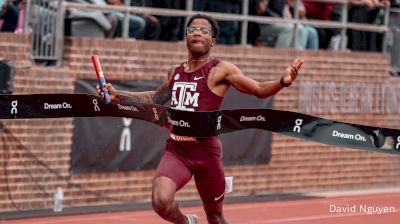 Texas A&M Track And Field At Penn Relays 2024: Aggies Results
Texas A&M Track And Field At Penn Relays 2024: Aggies ResultsApr 28, 2024
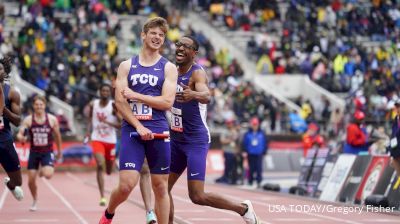 TCU Track And Field At Penn Relays 2024: TCU Results
TCU Track And Field At Penn Relays 2024: TCU ResultsApr 28, 2024
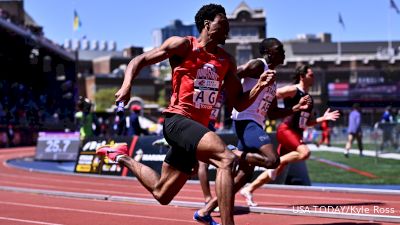 Ohio State Track And Field At Penn Relays 2024: OSU Results
Ohio State Track And Field At Penn Relays 2024: OSU ResultsApr 28, 2024
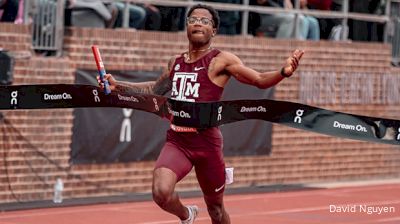 Penn Relays 2024 Results: See Which NCAA Stars Won
Penn Relays 2024 Results: See Which NCAA Stars WonApr 27, 2024
 Harvard Track And Field At Penn Relays 2024: Crimson Results
Harvard Track And Field At Penn Relays 2024: Crimson ResultsApr 27, 2024
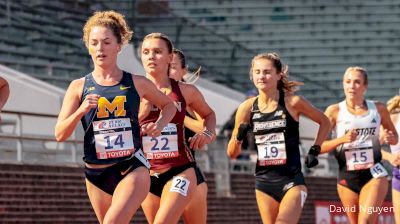 Michigan Track And Field At Penn Relays 2024: Wolverines Results
Michigan Track And Field At Penn Relays 2024: Wolverines ResultsApr 27, 2024
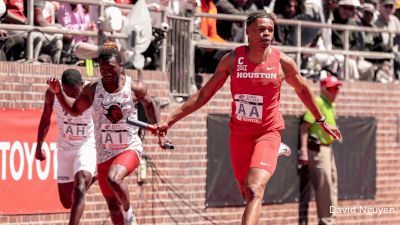 Houston Track And Field At Penn Relays 2024: UH Results
Houston Track And Field At Penn Relays 2024: UH ResultsApr 27, 2024
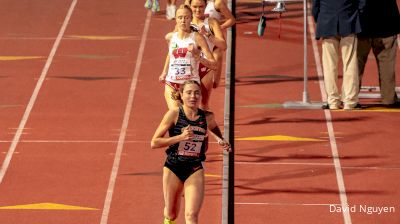 Princeton Track And Field: Penn Relays 2024 Results
Princeton Track And Field: Penn Relays 2024 ResultsApr 27, 2024
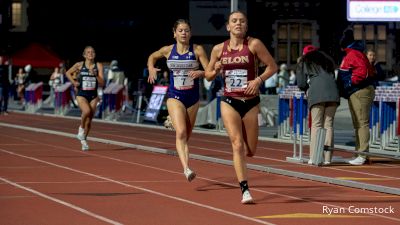 Jette Beermann Pushes To Win Women's 5000M Competition At Penn Relays
Jette Beermann Pushes To Win Women's 5000M Competition At Penn RelaysApr 26, 2024